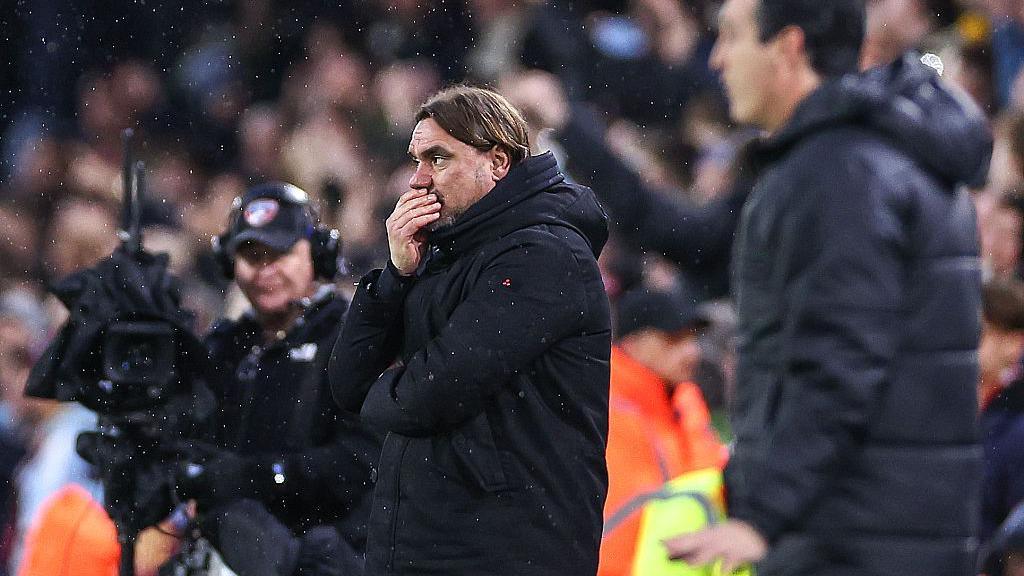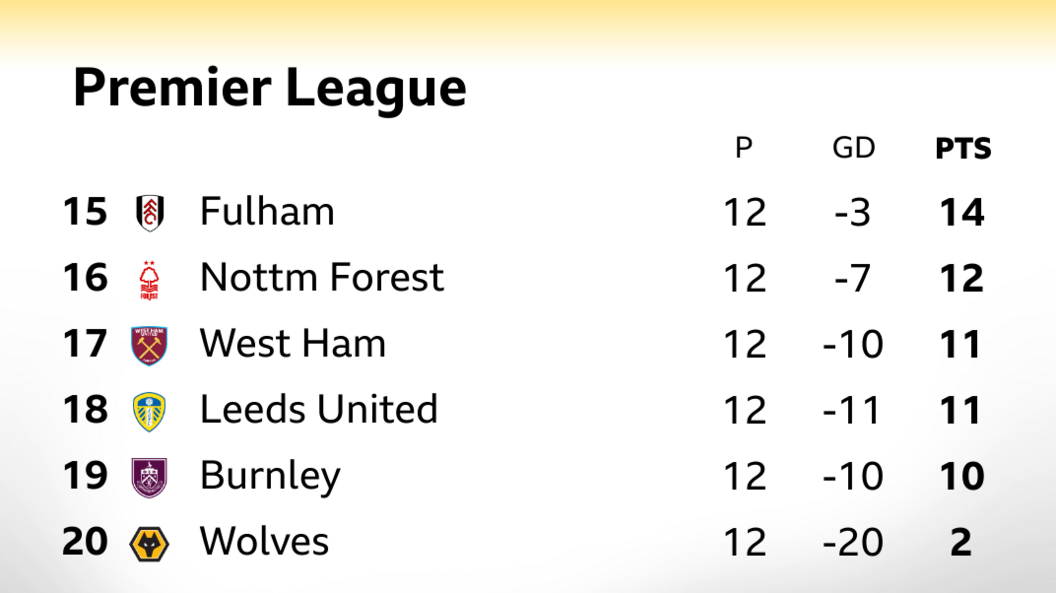'Farke probably feels like he is up to his neck in muck'

- Published
Football management is a precarious job, once described to me by a very experienced and knowledgeable manager as like being permanently in "muck".
His quote that always stayed with me was "you're always either ankle deep, knee deep or up to your neck in the stuff!"
At the moment, Leeds manager Daniel Farke probably feels like he is the latter.
Farke was lauded last season for gaining promotion from the Championship, and for the way he did it too.
Leeds had the players who, at that level, played expansive and winning football and Farke's philosophy and all-round demeanour won him many fans, not just at Leeds but in football in general.
Things have gone very differently for him in the Premier League, however.
'A change in wind direction among his own fans'

Sunday's defeat by Aston Villa means Leeds have taken only four points from the past 21 available, and have lost their past three games
This season, Farke's self-stated remit was to collect 38 points, or a point per game, a total that has proven enough to retain top-flight status every season since 2011-12.
Up until last weekend's defeat by Aston Villa, Farke was fulfilling that ratio, but he has suffered a change in wind direction among his own fans. It's a moment most managers would recognise, having been through it themselves.
What is most worrying about this change is that for the first time - even though, in my opinion, his team were playing really well against Villa - part of the crowd behaved in a very negative way towards him.
They showed their feelings about his team selection and substitutes, quite openly.
I have said in my previous columns that the game I love is all about the players and its supporters, but I will make a distinction here.
If fans on social media sites criticise a team, manager or club, it resonates in only a minor way compared to the effect of the same criticism from supporters who buy season tickets and spend their hard-earned cash and time watching and travelling home and away in all weathers.
In my experience, a lot of these supporters have a great understanding and knowledge of their team and the players, and have the right to criticise. Their reaction also has far more influence on the decision-makers at any club.
So, if you hear criticism openly in your own stadium like Farke did on Sunday, it means you are in trouble and that results must start changing quite quickly, especially in the Premier League.
'With any statistic, you need context'
Rogers nets twice as Villa come from behind to beat Leeds
Bringing any team up from the Championship to the Premier League is a fantastic achievement.
Farke has done it three times, with Norwich (twice) and now Leeds but, as I found out when I was in that position with Stoke, following it by keeping your team up is 10 times more difficult.
The same players who were rolling over Championship sides now find things much more challenging, physically and mentally. Technically, the top league in Europe is relentless and, as Leeds found on Sunday against Villa, unforgiving.
The buck always stops with the manager, however. Farke's win ratio in the Championship with Norwich and Leeds is 55%, but in the Premier League with both clubs it drops to 15%.
With any statistic, however, you need some context and I believe you have to consider he has always managed a newly promoted side, rather than one with established Premier League players.

Instead of Farke's target of a point per game, Leeds currently have a ratio of 0.92 points per game which, over a 38-game season, would give them a total of 35 points. That would have been enough to keep them up in eight of the past nine Premier League seasons. In the other, 2021-22, Burnley went down in 18th place with 35 points - three points behind Leeds in 17th on 38 points
Recruitment, as we've seen at the likes of Brighton, Bournemouth and Brentford, is crucial to any manager's chances of coaching a successful team.
But, nowadays, managers and coaches rely on so many more different components of the club than I ever dealt with. Recruitment is just one of them, and you need everything to be joined up.
Leeds appointed Sam Underwood as their director of football just months before the season started. I don't know Sam, but he has been at the club more than a decade and has worked his way through from managing the academy to head of football operations and now this.
It's his first visit to the Premier League in this role, however, and he has been given a massive job of directing transfers and selecting targets for the first team. It would be interesting to see how the £100m that was spent on new players over the summer has, in effect, bettered the team.
The sports science, or fitness, and medical departments are also key. Looking at their fitness levels this season, I believe Leeds have coped well in that area.
In my day, I made sure I was right in the thick of these different aspects of the club, because all of them could, and did, affect results on Saturday.
It is the managers who have to front up and face criticism after poor results, and I just hope Farke has all of the above under control going into their next three games against Manchester City, Chelsea and Liverpool.
'A manager must stand or fall on his own decisions'
Leeds were 'not good enough' - Farke
One of my biggest frustrations with all aspects of life, in and out of football, is how it has become commonplace by organisations and politicians to drop out feelers on certain initiatives, and then study the public reaction before deciding whether to proceed with them. I find it pretty cowardly.
Football management is not a job where you should bow to public opinion like that, so I was pleased to see Farke stick with Brenden Aaronson against Villa, when many Leeds supporters have made it clear they don't believe he should be in the team.
Any manager who is worth his salt will have the understanding and belief to back his own judgement.
Farke has said he will not pick players on the back of public pressure and, although everyone will have views about who they would select or not, any manager - successful or not - must always stand or fall on his own decisions with individual player choice, team shape and identity.
Winning is everything to any manager, and I've yet to see anyone put a team out that he doesn't think can win a game. All Farke is doing here is picking the players who he feels are the best fit with everything he is trying to achieve.
He and Leeds both need a win, and quickly, and I wish them both success.
Leeds are a great club with fantastic support, that belongs in our top league and Farke, having met him a few times, is a good man. Let's hope he can find a way of turning the tide of opinion in his favour.
'Winning hides a multitude of sins'
Ten-man Everton stun Manchester United after Gueye sees red
A footnote this week on the incident at Old Trafford on Monday where Everton's Idrissa Gueye was sent off for his clash with team-mate Michael Keane.
Everton boss David Moyes' comments afterwards on his players' so-called punch-up were brilliant, saying "it shows they care".
David, your team absolutely trounced Manchester United but if that sending-off had led to your side losing, I wonder what your response to your two players would have been!
Winning hides a multitude of sins, and that was certainly the case here.
I had to deal with the same situation as Stoke manager at West Ham in 2008 when Ricardo Fuller and Andy Griffin were involved in a very similar fracas, and we lost the game late on.
The two of them were very competitive players who hated losing. As soon as Ricardo got sent off, I got the kitman to go in the dressing room to make sure he was showered and changed quickly, and on the team bus before we came in at the end of the game.
That way, there was no risk of confrontation between them while the adrenaline was still flowing from the game and tempers were running high.
There was no way I wanted Ric and Andy in the dressing room at the same time, until I had been able to sit them down personally.
It gave me and the two players the chance to calm down, and we sorted it all out in training the next day.
Tony Pulis was speaking to BBC Sport's Chris Bevan.